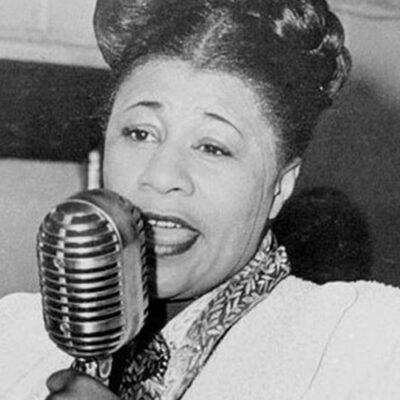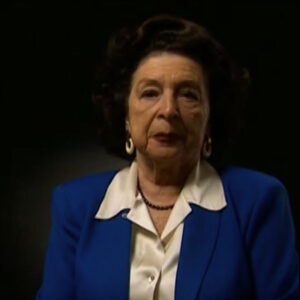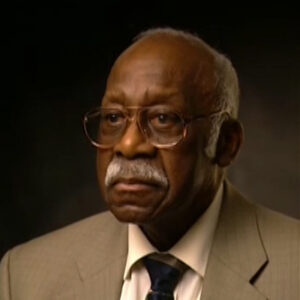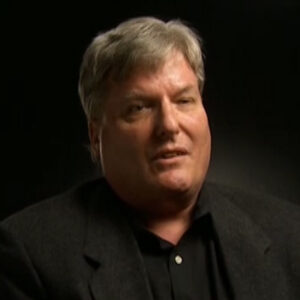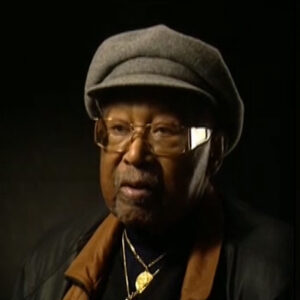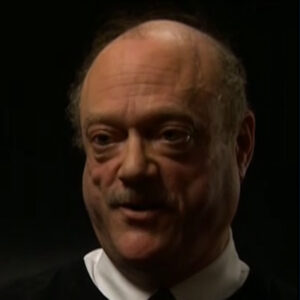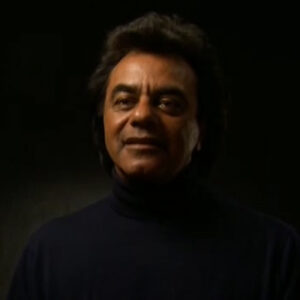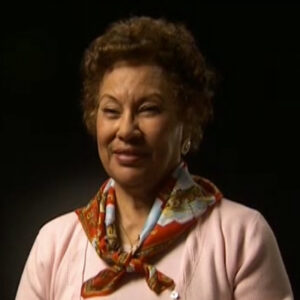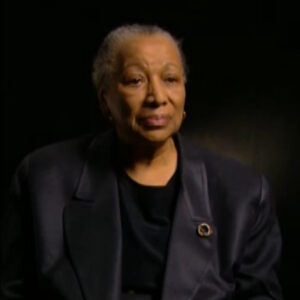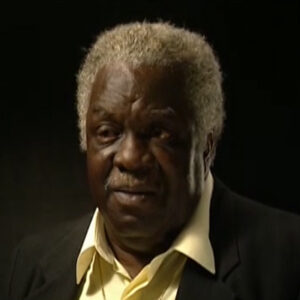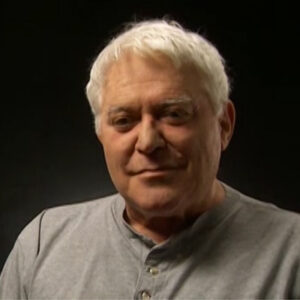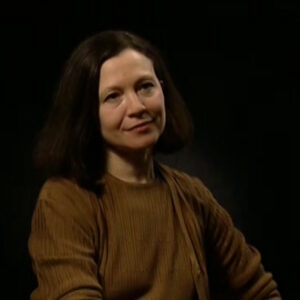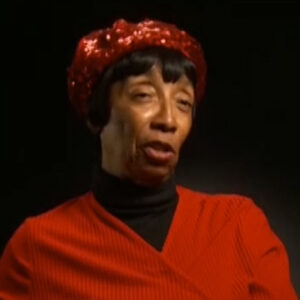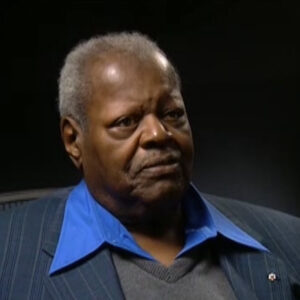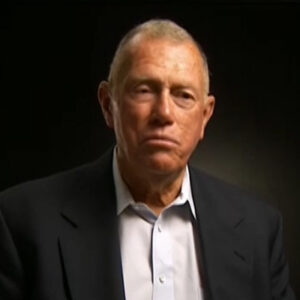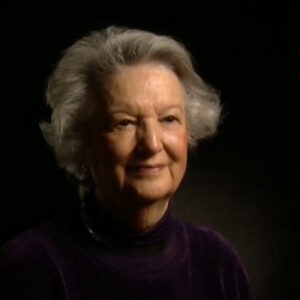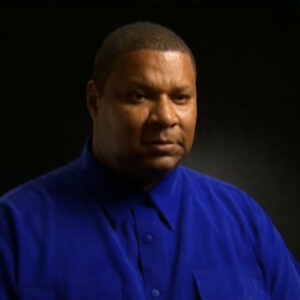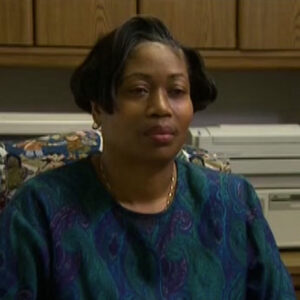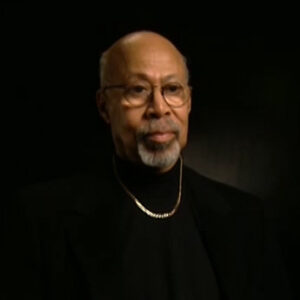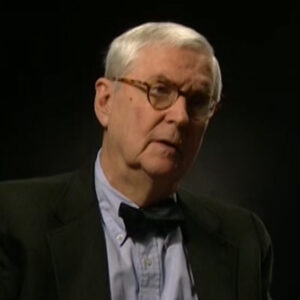Speaker Speed. Okay, let’s start by asking you major influences on you as a musician.
Speaker Well, I suppose you mean major pianistic influences or other influences. Generally speaking? Well, first of all, I’d have to say that my parents are probably undoubtedly the first major influence that sort of gave me impetus to stay in the business. They didn’t me Coulson’s and I took them not with a great deal of enjoyment at the time, but they made me realize that it was the thing to do. And I now, of course, I’m I’m glad that I did take them. I just know I’m sorry I didn’t take them even longer, but that had to be the first major thrust later on. So I began to listen to other pianists, Art Tatum, Teddy Wilson, actually Teddy Wilson first, as I didn’t you. I hate him until much later. Fats Waller, Earl Hines and any number of blues players. But they also, with all of these people, had a very different musical thinking.
Speaker Who would you say influenced you as a chemist for company singers?
Speaker Well, it would have to be Ella Fitzgerald because she was really the first singer that I accomplished. And she she liked, I guess, because of her beginning when she first started off her start in the business. She won an amateur contest. This I know about her, but not much else. She won an amateur contest at the Apollo Theater and then she stuck to singing with the Chick Webb Band. It’s a big band. So as a consequence, as a consequence, she was used to hearing chordal harmonies, you know? So when I became their competence, that’s what she wanted to hear. I played a big black chord kind of moving thing. Things, you know, brass figures read figures, background figures for you. She liked that.
Speaker I think we probably need a wider OK. Yeah. You’d be interested.
Speaker You’ll be fine. Yes. OK. Sorry. Uh.
Speaker No time yet.
Speaker Yes, I think yes. My late 40, 75 in the early part of 48. I know I did jazz at the Philharmonic tour that year and I don’t think Ella did that first tour. She did the tour the following year or maybe later on in the year. We had to do two tours here, as you know, at the very beginning and spring in the fall. But I know on succeeding tour tours that I did. She was always on them.
Speaker So did you two meet her before she went to chance? I think for a short time, yes.
Speaker At the time, Ray Brown, the basis was her husband. And Ray and I had worked together. In fact, I’d met Ray in Buffalo, I guess, about four or five years prior to that. And we became friends. And then Ray came to New York and I had something, some little insights from getting my job with Dizzy, an intern. And I think he got the job with Ella because, as I said, we had become friends. And he’s a wonderful bass player.
Speaker When you. What was your first impression?
Speaker Well, I had heard her before, of course, on recordings. Everybody’s heard a Triscuit, a task. I think that was very popular at the time. And I thought she was a wonderful song. You know, I didn’t realize at the time I knew she could sing jazz figures and jazz tunes. I wasn’t aware that she was so very good at doing ballads, which is something that many singers who sang jazz cannot do. They can’t do both. So they do great ballads then they don’t do jazz at all. I could do jazz and ballads equally as well. Yeah, and that’s what impressed me the most about me and her tremendous range and the fact that she could sing over adversity. I remember she had nodules on her vocal chords. She had to have an operation, I think. And within two or three days, the next day after the operation, she was back singing again. She had this tremendous down on she did it when she did three teenagers, really.
Speaker But she felt well up to do it, I guess, as you said, was more important to timbal or key.
Speaker Well, of course, Keyssar was important to singers. I mean, they have to sing songs that are within their range, that whole range.
Speaker So I guess what I mean is that if you’ve got a rap like I have or something, I don’t think Half-Step would make much difference with her.
Speaker I think she had a great range so that she could sing and either have to learn or have to hire. And I think a few times during that time, I had to say this, but the trick is sure, a few times during the time that I worked for her, I mistakenly played her introductions in the wrong key. And she said it didn’t matter. I heard about it later, of course, but it didn’t bother her interpretation or hear about it. Well, let’s say that a few well-chosen chosen words and phrases more quite to the point and specific and so forth, don’t do that any more.
Speaker How would you get prepared for engagement with Ella or just in a.
Speaker Well, the I guess the first step, especially if you’re if you’re planning for a mercy, you have to do three sets or three shows. You would then pick out the songs, the selections. You try to program it so you don’t do everything the same time for the same mood, you know, that sort of thing. And then you have plan the program for the entire night. You wouldn’t do it for more than one night at a time. As you play an audience such a play room, you get a feel for what the audience likes and will accept and would enjoy. So then you plan your program accordingly. So would she. Ella was pretty good at that. Well, sometimes she would change on the set if somebody would ask for a request, for instance. So somebody might come over and say, can you play? Come in, come shine. Either one that people would ask for tunes that we didn’t have programmed. And if she knew them, you know, she would she would do it, you know, without a rehearsal, without and would just do it. She’s very good at that. And if she did, she happen not to know the lyrics, that she would make up lyrics on the spot just like that? She was very good at that.
Speaker And she had like an enormous book do. Very appealing. Yeah, rushing out.
Speaker I don’t know how many tunes that she actually knew. I’m sure it was in the hundreds, maybe because then, of course, she was always adding to her repertoire. She never stopped. She was always learning, rehearsing new tunes. Every week we would get a stack of tunes like this that somebody wanted to be played or heard or sung or recorded. And if she liked them, she would do in some cases, even if she didn’t like the tunes, she would do it anyway. But her up trial is always increasing. She was always adding to her store available tons to do. So she never ran out of tunes. And if she ever she wanted to, you could just get on the bandstand and make up something. And this time she had she had this great. She had this great way of improvisation. She could improvise anything, any time about any subject. She had this great, great ability to do this.
Speaker She she essentially came out of the sweet era. Yes.
Speaker Well, I guess she sort of came into this. You might say maybe even before that, because I believe the Chick Webb Band was in being before. Let’s say if you want to use another band, Benny Goodman, before the Benny Goodman era, before the audience Shi’ah slightly before that. So you might say that she started just before that age, helped to move it along.
Speaker Now, I’ve read that Would said that she was the only swing era musician who successfully went on to BOP.
Speaker And that may be true. Maybe you’re right. As I said before, she she had this great ability to do jazz things, bop, I guess you could call it, but before it was even called bop, and then she could turn right around and the next selection and do a beautiful ballad. And so, yes, I think she had a lot to do with that. I mean, she proved that it was possible for singers to do it, certainly. And she did it so beautifully without even without a lot of effort. You know, she did. It wasn’t as if she sat down and studied what I want to say. Doo doo doo doo doo doo doo doo doo doo. She didn’t have to think about it before she did it. It was very natural to her. And I think that’s what that’s one thing that stands out about her work. Naturalness without effort, just a flowing way of doing things. Where do you think she learned that? Well, a lot of it was just innate. I think it was her natural ability. She may have learned some of it from listening to other soloists. Strangely enough, you know, singers can learn a great deal from among instrumentalists. I know she admired Lester Young a great deal. She admired Coleman Hawkins. These were the players who also were playing on GTP at the time. And I’m sure these were her favorites, as well as many others that were not even mentioning it. But I think she combined as she had another what she did when she was improvising bop, bop, bop, bop. I think she was thinking in terms of an instrumental interpretation, and she imagined herself she projected herself as an instrumentalist rather than as a vocalist. So it came out bop or slightly. And then what? She was doing a ballad. She could say that she was perhaps projecting herself as trombone solos or trumpet soloist or a violinist or some perhaps, you know, and whatever she did, she individualized it so that she knew it was Ella Fisher. She had a distinctive style that is very difficult to imitate. People have tried to imitate her, but in my estimation, never very successfully. Now, I guess I’m spoiled because I. I heard the real thing.
Speaker Yeah. I heard somebody said to you people. Some singers would oftentimes scat with it. Right.
Speaker If you play all over the place, blood would be running in the streets of al Qaeda. She never did it with any idea of trying to make any of these little anybody else. She did it because that was a natural thing for her to do.
Speaker You know, to to even.
Speaker And that was in nineteen forty eight shortly after I started to work for after we’d done and maybe one GTP to work together.
Speaker And how did he go to traveling.
Speaker Well we went over on the Queen Mary. And when we came back we came back right back on the Queen Elizabeth. So they got there. Sale on the two ladies, but it is very interesting trip. We paid Scotton Newcastle across London and we won one deal with Gracie Fields, by the way. And it was interesting. And those that we had when we played Scotland, we had a we played our high school auditorium and there was no conductor other than that the band conductor for the high school who was very used to it. He had never had any experience conducting any jazz scores before. And all I was doing to us, like lady be good friends. And so her music, the music that the conductor scroll is about this thick. It was like an accordion style. It be folded up now. And he forgot to turn the pages as we progressed to the music and somehow the score on the floor on the floor of the stage. And as we kept on playing at this temple, the conductor had to get down on his hands and knees and turn to score and try to conduct.
Speaker It was hilarious. Ella just she broke up. We got through it. What was it like traveling with him?
Speaker Well, I guess just like any other group. It was always pleasant. I always tried to leave. She always managed to travel first class. And, you know, we never had to ride buses all night or anything that, you know, travelling was very nice. It was very pleasant. I enjoyed it. I would never really enjoy traveling that much. But, you know, it’s part of the business. You have to do it. And some of the places are maybe too short. The distances are too short to go by plane. The distances were, let’s say, maybe four or five hundred miles apart. You know, that’s the venues. And we would travel by plane. Other than that, we would travel either by car or train.
Speaker And so it was always very comfortable and wanted to see Prince Harry else in her time on the Queen Mary.
Speaker Well, I suppose perhaps you’re getting a little bit seasick like surfacing. But when you when you take a trip like that on what our heart is today. But in those days, if they knew who you were, then you were requisitioned to perform at a concert maybe two days from then or something like sometimes you had maybe one day’s holidays here and it was a full dress, conciliatory tuxedo. The whole thing is full dress and it’s sort of a command performance for the for the ship’s captain. So we did that trip while he took, what, about four, five days. So there wasn’t much traveling, maybe just lounging around during the thousands of miles of ocean, you know? And fortunately, we didn’t have very rough seas on the trip back. We had some rough seas with you on the Queen Elizabeth. But we made it.
Speaker Oh, I love to dance.
Speaker Well, she. I think I think did a little dancing early on in her career, perhaps even on that show that she you know, she won the amateur contest. But you won that for singing. But I suppose that at some point she had to dance, you know, and of most people did. Most singers of that day did dance. And she was a very good dancer. She got a little perhaps a little heavy. It might have made it a little difficult for her to dance, but she’s a natural dancer, just like everything she did. She’s a natural singer. She’s full very well. And I think she could have had a great acting career if she had really wanted to. I really believe she could have. Why would you say? Because, I mean, she handle very situations very well. And she was never at a loss for words. She could always improvise. Thanks. I’m sure she could learn lines. And she had a natural way of looking. I wish you would. I think that, for instance, you look at the case of Frank Sinatra. Sinatra was a good singer who wanted to act and he became a great actor. You know, he started out as a singer. I think Ella could have done the same thing. Had she really wanted to. Because I think singers, good singers have a way of delivering the lines of a song to make them more, say, believable or understandable. They phrase as if they were speaking a line and then maybe the secret, you know. But Dialla had that ability. She phrased so well Sinatra phrase beautifully. You were around during the time, and I think when Movil manager Gail Tim Gail, they were the managers vying for his Ginder and they took over a booking. And I think they also played a part in her personal management as well. Yeah, because they were the only ones who were close to her. They did a good job of keeping her busy. So she worked constantly, like kind of a cosy deal for them.
Speaker I mean, I was the manager. Tim was the booker.
Speaker Yes. I suppose sort of. They kept it in the family, so to speak.
Speaker Did she ever talk?
Speaker No, she never did. And I didn’t get into that with her because I was I was too busy trying to take care of my job because the company cannot play records. Norman Grande’s came on a little bit later at the time we did Jay TV. And of course, Ella did. I think all of the GTP things, even after I left, she was still doing it. They did about two or three years of GTP after I left, which was 1951. So they I guess they became pretty good friends that I think Norman became her manager as well as Booker. She sort of took over her time deal and a little girl left off at the time.
Speaker You with your. You did a film clips on her a little bit later, and she had a very simple, direct way. You know, she stood there and she sang. And then later on, she becomes much more precious on the stage, animated. Then perhaps there was always animated that she had no gimmicks. I don’t know. You know, she was a good person. Critical voice.
Speaker I guess she didn’t think it was necessary to do any of those other things that some singers do. Perhaps they think it’s necessary to enhance their singing. I don’t think it does. But after all, you know, when you’re on the stage, I think what people are really interested in is how you sound. Not so much how you look. Actually, look, I mean, that’s all part of it. But primarily it’s what they what they want to hear is how you’re going to interpret the song, preferably a song that they know. But I think that’s really the focus. And I don’t think Ella was ever interested in doing anything other than than just doing it the best way she knew, which was pretty good as Bing Crosby had a lot of other people said. They said she was perhaps the best singer Bette ever heard. And that’s that’s a lot for Benke, because Bing Crosby was an excellent, as you know, an excellent singer himself. And I think he made the statement something to that effect. She was a great singer. Did it hurt? But she was well liked by many, many singers, most of the songs of the day.
Speaker Let’s say you’re sad. She might.
Speaker She like Dinah Washington. So I guess because Dinah was a stylist, you know, she had a unique way of singing and Ella appreciated that. And she had a certain sincerity and her style and she officiated that. I think that’s her. I think she liked her as a person. And they were very dissimilar. They were not alike. Is it like, you know, I like things a try. But she died. I did a lot of things that I did a lot of other singers I have imitated or tried to imitate. She’s one of the most imitated singers today, although for the people who are hearing those singers for the first time, don’t know that those singers are perhaps I didn’t hear Diana or Ella. And Sarah is not the singer who admired Ella or Ella, admired, too, as well. They were contemporaries and I think they had mutual respect for each other.
Speaker You did mention that, Billy.
Speaker Billy Well, of course, she liked every. She never did talk much about Billy. But I know that she liked. She liked her style. She she thought a lot of there. She was a good distinct stylist that you can never mistake for anybody else. She had a style all of her own. I think that’s that is something that can not easily be said of a lot of singers. I think most singers aspire to have a style of their own. They don’t always achieve it. It’s not that common. It’s rather rare.
Speaker Well, you know.
Speaker During the 40s and Elvis career, people said she was an inferior material.
Speaker While Billy, in the late 30s and 40s was recording, there are now considered to be classic. Yeah, they weren’t.
Speaker Some of them weren’t at that time. Like travel light. That wasn’t too well known. What’s the other thing she’s done? She did. She did a lot of things that I think she would. A couple of things. Yes. Saw that she recorded, I think, with Paul Whiteman. And I think that’s what gave Billy a big impetus. You know, the big push, the fact that she had recorded with Paul. I mean, Paul Wyman was considered the king of jazz, not the case at that time. But certainly I think that helped her career, sort of gave her a jump off point and she did some things that were wrong. But most of the things she did were rather relatively unknown, unknown at the time. I think she had to do things like that. I mean, how do you know, for instance, in advance for the unknown to him that you record the days are going to be a big hit two years from now or five years from now. You know, that’s it frequently happens that we’re in this business now.
Speaker Over the years, lots of different things you said about Ellen. And one thing you said previously was that she couldn’t sing the blues.
Speaker Well, I don’t I don’t know whether I agree with that or not. You know, I remember a tune called Black Coffee. Now, that wasn’t primarily a blues, but it had a great blues flavor. Also come back. I’m sure I had her either way. I had a great blues flavor. Yeah, we did several blues numbers. I don’t know anybody could say that. I think it’s somebody who wanted to have something to say about her that was a lot less complimentary and not actually factual. I beg your pardon?
Speaker Oh, yeah. I also heard that Ella creative mean harmonica.
Speaker No, I never heard her do that. You know, I’ve never I never heard that. And she never she never brought it out in our presence. Maybe she did that in the dressing room when she was alone. I thought I heard of even singing about that.
Speaker I never had to talk about it because it was used to do it on the bus. Oh, Ray reground his face out. Oh, really? I never I never saw that tape. Well, I must have been asleep at the time.
Speaker I think, you know, one thing, I heard one musician say that if he had a choice between the piano and Ella, he would to help.
Speaker Who was that? I to imagine. Jamal? Well, that’s odd for him to say. He’s a guitarist. And he would he’s a man who would appreciate harmonies and chords. And Sofra, you would think that if a good pianist, good pianist was playing somebody you use cause that Jim Hall approved those just have to listen to the pianist. But I can understand his feeling about that, too. She was so unique. Anybody who liked to hear a good vocal and place or let’s say an ordinary fans when it was not out of the ordinary singing, but prefer listening. Maybe Jim was referring to a pianist who is not a pastor. Terry Wilson’s caliber or Tatum’s caliber. You know, I don’t know why.
Speaker Hello, how are you? Good day. A coffee.
Speaker Heard what I. No, we’re all set.
Speaker And any time she’ll be here in the jazz at the Philharmonic. Tourist. Famous kind of jam session at the end, huh?
Speaker What would you say about Ellen’s participation?
Speaker I don’t think the ones that I am familiar with are the ones I remember. I don’t believe you did an awful lot. I think it mostly was dominated by the horn blows. You know, guys like Roy Orders, Charlie Sherazi, flip flops know people, the horn hoppers, Lester Lester Young, Coleman Hawkins. And later on. Carol, I did tell her, but, you know, I wasn’t. I didn’t intake shoes. I didn’t really enjoy that much. I thought that, you know, you can go over the line with another with a certain amount of it is fine. But when it gets to the point where it becomes more of an exhibition than pure jazz or pure music that’s being played. You know, I think you’ve stepped over the line, you know. You see, I don’t think exhibitionism has nothing to do with real jazz. I think at this point, I’m separating myself from the mainstream, you know. But I just have never believed that jazz meant you’ve got to come your way through it and not play jazz. You know, another, you know, appeal to what people are seeing rather than what they’re hearing, what they’re listening to. I think at that point you lost it. Maybe I’m wrong. And I think that’s what happened many times on gay TV. I’m sorry to say that. In fact, that’s one thing that sort of turned me sour on it. I really didn’t enjoy it after that. You know, I’m sorry to say I destroyed my musical theater. You don’t recall participating? She probably did. You know, but if she did, it was probably, as far as I remember, a minor way. Know, normally when something like that happens, if they’re on somebody else’s cover, of course they’re going to participate, you know. But, you know, and I don’t think in her case there was any exhibitionism involved. I think it was just pure musical thought and musical expression, which I’m sorry, I cannot say that for some of the others. You know, when you queen, you lay on the floor and you hold your horn up an ear and you flop wrong like a fish out of water.
Speaker That is not just what I was getting at, is that sometimes she was like a horn.
Speaker She did that all the time anyway. You know, whenever she improvise, whenever she bugged the scat or bop and she projected herself perverse as a horn, she used to do an imitation even of slam studio boring and later be bursting with a section where she was doing the things that I’m sure you’ve heard it many times. And she had this great, great ability to project, you know, imagine herself as instrumentalists playing. Whether it might be trumpet might be. We talked about the slam story or I don’t think I heard her everyday drums yet. I don’t think she got that far. I mean, it could always expect something like something spectacular for her when she started to sing, you know, especially when she started to sing jazz.
Speaker She was quite anemic. I mean, this stupid thing to do, Louis.
Speaker No, she did, of course. Lester. Yeah. I think she wrote a tune called Rough Ride and the Rough Ride. And it was based on a link that Lester might play. His style. Like, I collaborated with her on this tour. And it’s it’s quite typical of what Lester Wood plays. That’s what was called Rough Ride. And it came about because we were on a train coming from Reno and got trapped in a horrible, horrible snowstorm. And when we reached Chicago, we had to lay over all night. And the temperature, though, I think was 20 degrees below zero or something like that. And we couldn’t even get off the train. It was tragic. But the tune was written between Reno and Chicago. So when it came out, it was called Rough Ride because it was a rough ride, you know, pretty rough.
Speaker That prompted that. You’re sitting on the train. That’s right.
Speaker The idea came to her and she mentioned it to me. And I tried to play some harmony. I thought of somebody there was a piano on the train, but I just thought of some harmony that might fit the melody. And it turned out that was pretty upset when we got to New York. We played it for a few people are gonna recorded it. We had about 14 or 15 recordings. So I didn’t do too badly.
Speaker You’ve heard the term.
Speaker Did we ever see some signs so easy to sing?
Speaker I’m thinking, yes, I know what you mean.
Speaker It’s a rough lot about it, but it’s not that difficult. Not for her. It’s exceptionally easy. You know, the range is not too great and the verses was very simple. And I don’t think it moves more than three or four steps forward. But I don’t think many singers do it. I, I don’t. I don’t why they don’t. Because I think it’s an excellent song to sing. But I think it was conceived more as an instrumental, I suppose, by Billy Strayhorn, who’s the bridge where everybody stands out at a time.
Speaker Well, absolutely, yeah. It’s that the intervals. A little tricky there and some things that I’ve heard never quite get it right, you know, but they do it anyway.
Speaker Jim to.
Speaker I did a recording date with a lot lately, and I’m reminded of it from time to time because I still get residuals from, you know, which is not bad at all. I wish I’d done about 100 hundred more like that now, but I think that was the only time that I ever actually worked with Louis at the same time, although I remember once we were in Chicago. Remember the old blue note, the change locations, but the original location, I think was upstairs. I believe, you know, we had to go up a flight of stairs. I think the second location had to go down a flash. I think Louis was there once. I think I went by and I’m thinking of setting with him or something. But the only time I actually worked with Louis and all at the same time was on that recording. And it was a decade. Thank you. I mean, I imagine you’ve heard another car wreck and one of the records where you hear me? I think we did two, three know three sides, I believe. I don’t think we did four. We may have it. My memory is all hazy.
Speaker I just remember the days, you know, we went through different principles.
Speaker That may have been one of the times. But, of course, you know, that has been recorded by Nat and some other people, too. I’m not sure that may have been one if Louis did it. He may have done it with his regular group, but not without it. But if Ella did it and should have done it at another time, I mean, not have been with her at the time, you know.
Speaker Could you describe the studio between the two of you?
Speaker Yes, not really. What I do remember it was that Louis was so relaxed and so natural. He didn’t go around thumping his chest. The great I am, Louis, you know, you never heard any of that. You know, I was just this guy. You wouldn’t you wouldn’t know that he was in the recording studio. From his attitude. From his demeanor. Neither was Ella. Ella wasn’t like that either. You know, I remember the drummer on the beat was Stanley K.. And I don’t know why I suddenly remembered his name. And I haven’t seen him in 20 years. But anyway, he in fact, he used to book as Our Economy, the book. Artie Shaw. At one time he used a book, Buddy Rich, I know later on. But I was a nice little drummer. And that debate went very smoothly. Who is he? I’m I’m I’m I’ve had to think about this. I’ve only worked with one and I’m at a doctor. So if I can come up with his name, that has to do. I can’t think of it right now. But it was it was a very relaxed guy. That’s the thing I remember most about. It was so relax. No pressure whatsoever.
Speaker There was a considerable difference in age there, you know.
Speaker Well, I wasn’t that old. Oh, you mean. Oh, I see. Well, you know. Well, let’s see. Youngest song. Yes. Because I know it was, but I don’t know what adult he was. That was early. It was a well guarded secret at the time. My lawyer was, I think, of course, older because he’d been on the scene much longer. But then he was not an old man either. And I still certainly didn’t song old enough.
Speaker And how did he get here?
Speaker Well, with great respect, you know, they worked because it just like they’d been working together for the last 20 years. You know, that’s the thing. I think when you get two superb musicians together, whether it be singer instrumentalists, you will find that they always work together. Just like by hand and go just like it is always a perfect fit, you know, I mean, assuming that neither one has an attitude. Well, neither Louis Ella had an attitude. I think you know what I’m referring to. Neither one of them had this great I am attitude, you see. So I think that made it work. And of course, they were both superb musicians and that was the other necessary ingredient that made it happen.
Speaker People say that she had to speak with remarkable humility like she did.
Speaker She. That’s absolutely true. She approached everything with, I say the humility, let’s say, someone who had never experienced it before. You know, when she sang a song, it was as if she had done sort of a naive approach, almost childlike approach to it. And that was her approach to most of the things she did as far as the performing is concerned. She never. I don’t know, maybe, you know, in a sense, you could say that a lot of people would would consider that a lack of, let’s say, showbiz awareness. But I don’t think so. That was her natural way to feel she’d done it any other way and wouldn’t have Benalla. That was part of her charm appeal to people. That’s what they appreciate. That’s what they like. That’s what attracted people to her. This naturalness, nothing from nothing artificial. That was her style. Was she competitive in the sense that she was saying with the best of the middle and everybody sort of worst Paria? If that’s being competitive? Yes. She never went out to say, I’m going to do this better than those four songs. That wasn’t her idea. She only did what she does best. And it turns out that that’s what a lot of people, a lot of people appreciated. That made her competitive in their minds, but not necessarily in her mind. You say she didn’t think of it in that in those terms. Sure. She was never trying to be better than somebody. Maybe she was only trying to be better than her last performance, which I think to me is the essence of sincerity. You you tried to you try to do better than you did the last time. You know, when I I try to do that, I’ve never been successful. And I’m always worse than I was last year. But if you can always do better than you did the last time, you’re making some progress against me. And I think that was her general attitude. Competing with her soft innocence. So in that sense, she was competitive, if you can. It’s a mental exercise.
Speaker But she she knew she was.
Speaker I’m not sure she did. Not to the point of saying, I am.
Speaker I am. I am. It’s just that I am who I am. And there’s nothing I can do to change that. I don’t want to change it. I want to be what I am. Because if I am and if I’m something else, then I’m not who I am.
Speaker You know, why profess to be.
Speaker Know, Stanley probably went hung out there. He used to manage. But, you know, one night we’ll say that that’s our part of the story. I can tell it’s a very rare look. It shows.
Speaker And he said he’s trying to time of stream songs like he would.
Speaker Right. Right. Well, I think she did that as a concession to maybe a publisher who wanted to have the tune recorded. That’s always a feather in the publisher’s cap. You know, if they can get somebody like Ella, some headliner to record some little tune, it’s a little dinky, too. That does mean, although I think the song had a certain appeal for younger people and it’s a considerable number of older. And she did also. She did the music goes round and round and you put it puts the first round on the musical right or on or on. And it comes out. And she did that and she did some other thing. She may have done even the three little fishes, you know, which is another one of those little nonsensical tunes. But some people like those kind of things. It sort of takes the tension away from it, relieves the tension. Some speaking.
Speaker What does it do to the piano?
Speaker Not much better, but it’s all part of the job. Don, if you if you if you go into a job with the attitude that whatever you do, it’s comfortable because it’s part of the job. And it’s it all becomes a part of the whole you wouldn’t want to do the same tunes every night, the same way you changed the tune. So you change the style of the tone. You might you know, you change the approach and it can be done with taste, I might add. So you don’t have to do a dislike. You know, everybody on the street corner does it. You know, look, with your own individual approach, your own individual style individual interpretation, which then makes it a part of you. When they hear you do it, it’s not the same as doing somebody else down. You know, in Afghanistan, you’re still pretty tough.
Speaker So I didn’t want to say that as you.
Speaker Oh, I’m with for your time, playing golf coincided almost exactly with your marriage to Ray Brown.
Speaker Well, she would marry should write, Ray, I think, shortly before I joined her. But, Charles, you could say that almost. Are you inferring that I had something to do? No.
Speaker No, what I meant was that I would be happy to see you were.
Speaker Well, I don’t know what the reason for that is. I think you’d probably have to ask Ray. I’m not sure he knows. I don’t think when things don’t work out, I don’t think either one of the parties really know why it didn’t work out. Maybe because maybe that’s one reason it didn’t work out. Because they never really found out why. Maybe if they delved into it more deeply, they could discover the reasons why it wasn’t working out. And they would take steps to correct it. I don’t know. But anyway, it apparently didn’t. So that’s history.
Speaker He left in 1953, right? Actually, I left before that.
Speaker In 1953, I was working with Artie Shaw. But I don’t know.
Speaker There were a lot of things. Some things just didn’t happen. Right. You know, without going into great detail. And I thought it was probably just the time to leave. Maybe I left too soon. I know that when Tommy Flanagan took the job, he stayed there for 15 years. So maybe maybe his degree. Say his degree of tolerance was a great deal greater than mine anyway. I think people change occupations and jobs for various reasons. And I don’t think there’s any one. And I couldn’t put my finger on a one reason why I left, but it seemed the thing to do at the time. I guess that’s the best answer I could ask.
Speaker Peterson said in an interview. You know, I stay away from the series altogether.
Speaker What would you say that?
Speaker Well, I would say that if you can manage to do say something like that and implement it, then you have a great deal of independence, you know, to confront the cop now. But I mean, some some people like accompanying, you know, I liked it. I thought that I had done as much as I could in that direction. And I wanted to actually wanted to play more. That’s probably better. That was probably underlying the underlying reason. You don’t get an awful lot of opportunities to play when you’re in a company. You play, but not solo. You don’t. You can’t because you feel your company. You find, you know, by definition, you’re not going to be soloing. You know, what you’re doing is a company, the singer, you you’re filling in the slots and so forth. But if you want to be a source, then you must play solo. And of course, the more you do it, but it becomes the more you accompany the body, you the better accompanist you become if what you’re doing satisfy the person, your company. And I don’t have any problems with that, with Ella. In fact, after I left. I was asked to come back, but I didn’t. I was working at CBS at that man setting out to leave that job.
Speaker That’s very.
Speaker How did she go about getting what she wanted?
Speaker Well, I mean, musically. Well, she had a definite idea when she would pick out a tune to do a song. She would have a different idea how she wanted to do it. She would convey that to the musicians. To me as the pianist. To Ray, if we had we usually worked with her as a trio, Ray Brown, Charlie Smith and Ginger Smith, Jones and Brown. Sometimes we’d check into a hotel, you know, put our names down the crooks in, and I let you know she’d let us know what she wanted. And we try to do it to her satisfaction. After all, she’s paying us great crime. How she would not you know, she would either indicate shoot, first of all, the key that she wanted to do it. And that’s very important. And if it was a ballad. Now, many times she would just say it’s going to be a ballad. So like a ballad push, a nice soft approach with block chords, soft harmonic things, maybe an interlude here and there or something. But usually it would be up to us. A great part of the arrangement would be up to the base for the parties to try to put together if it was something that she liked. She would indicate that she liked it, that she didn’t like it just won’t change this or change that and try to tailor it to her. Likes to watch and desires. We tried to do that and it seemed to work out most of the time. But on some other things, she would have more definite ideas about what she wanted to hear, and she would tell us what she would know, exactly what she wanted to hear. And we’d try to do it. And if we didn’t do it correctly, it was always a big club over there.
Speaker She would this on your knuckles. FTD, he laughing, I’m dying. I got a piano teacher once, you know, she always kept big rock on the piano. This a true story. It didn’t place any right. She’d crack your knuckles with this rock. True story. Pretty wise. We hope to get results early crackers.
Speaker Did you did you stay in touch with all of them?
Speaker No, not really, because we’re going in different races. I was always this way kids years ago. And as I said, young Tommy Flanagan, our company here for fifteen years after I after I left. I certainly must have enjoyed it was Tommy is a great pianist and a great accompanist. He managed to do both successfully. I mean, because when he was a company, I don’t think he ever lost his knack for solo play. He does a lot of today and he still works with the trio. And while he was with Al, he didn’t lose a thing. Actually, you get. I think when he worked with the saying you don’t really lose anything because you’re you’re gaining the ability to try to adapt yourself to a company, which is a rather difficult thing to do to do it correctly. It’s not as easy, it may say, as it may seem. So you have to do it a certain way to get the desired result. And you have to live to please the personally. You’re a company and still the musical and play in such a way that you don’t lose your individuality. But you do as you try to maintain your individuality while at the same time supporting the singing or the solos accompanying is almost the same, whether it’s a soloist or a horn player or a singer. I must say the festival is the same. You’ve supported the solos and whatever they’re doing, and if you stay out of the way, you try to support. Sometimes you lead, sometimes you follow that at all, times you try to play with taste.
Speaker It’s very simple, but very difficult.
Speaker But, you know, it’s hard to say. It’s that simple isn’t easy.
Speaker Yeah.
Speaker Now, you’re definitely split, deteriorate.
Speaker Not while I was respected. Well, what do you think?
Speaker Over the course of time, anybody’s voice will, you know, know if you’re if you’re lucky when you’re 18 or 20. Your voice is not going to be the same when you were 60 or 70 or 80. You know, it’s going to change. Our lives may drop. For instance, the range may drop, for instance. Now, I know that once I did a sub for Tommy, Tommy Flanagan had a difficult time getting New York to New York. And so Norman Grams called me up and asked if I’d come down and play for the hotel. So I said fine. And I noticed that some of the top tunes that she had sung in a hierarchy earlier, she now sung. Maybe you have to hold whole up later, Laura. So that happens. But I didn’t notice any change in the quality of her voice, just the range. And I think that happens over time is that the vocal chords either loosen or something. I don’t know how that works. Not being a singer, but I know that changes do take place. I don’t know. I don’t know whether you would call it deterioration. I don’t think that’s the correct word. I think if you say the range drops and the quality is still there, it hasn’t deteriorated unless you lose the voice completely. Not okay, then that’s the situation. And I don’t know that that happened. Maybe it did.
Speaker I know I was aware of that, but it did not happen while I was with Ellen said this about you.
Speaker I don’t know whether I want to hear this or. Okay, listening to this cause every night was like, you’re treating. Oh, well, I’m glad you thought so.
Speaker ALISI Let me dissect that. I’m sure she meant well. No, no. Well, I mean, I just tried to play the right course. Yeah. And I didn’t try to be fancy or anything, you know, as I said, I tried to use the block court approach like that, the ensemble band approach, because that’s what she had been accustomed to hang with Chick Webb. So I tried to use that same approach and she liked that. Now, later on, some more companies to work for or use a single finger line of a company, a company that which is sort of on the left. I played a couple of days with her. That’s what she liked. But dial it like the chords. Well, she had a lot, of course, for me because that’s what she wanted to hear. I hope most of them were right. I’m not sure they’re all right.
Speaker Oscar Peterson said this. I could never do any better. Did he choose these two breeds together? We anticipated your freezing was uncanny.
Speaker That’s a very kind thing for us to say. Well, as I said, all I tried to do was to accompany and to stay out of her way and try to do something that supported what she was doing. And there are many ways to do that. Didn’t do it harmonically and rhythmically. Ideally, should she do it both rhythmically and harmonically, you know, at the same time? But it’s not really too difficult, but you have to know where to do it. That’s a difficult one. You hear a lot of confidence. Who in effect, I really soloing behind the sofa, the singer or the soloist. And that’s wrong. What they don’t realize is how they keep Doug doing and they sound more like they’re playing a solo than they are playing accompaniment. I don’t know if some some parents never seem to London, but there’s a difference between a company and solo. I just tried to accompany now when I had my chance to play with the trio. I used a different technique. But that’s what you have to do. You have to adjust to whatever situation you find yourself in.
Speaker Well, I think the interesting thing yeard when I ask you said was anticipatory freezing.
Speaker I guess when you work. I’m not sure I did that successfully. You know, I think when you try to do that. But then if you if you get too ambitious a bus, sometimes you can get too far ahead. You don’t want to lead the singer in a direction that she doesn’t want to go. But if you’ve been working with a singer for, say, a given time, given, like the time perhaps you you’re accustomed to where she is likely to go. So you try to go that way, you know, harmonically. And this is something that is very true. It’s a lot easier to do a show on the piano than it is to explain. But there’s a way to do that. And if it’s done correctly, as it can sound, as if you anticipate. But what you’re actually doing is following a pattern that she has already set previously.
Speaker If you could enter. Once on Sunday.
Speaker Would it be hard to say she did so many things so well? And of course I love the way she did ballads and I could probably name three or four tunes that neither one of which you could put them in any order that you desire. You know, remember tune called Crazy. He calls me someone to watch over me. I’m sure she did a tune called Blue Walk It to them. One time we we were playing in Washington, D.C. in a place called the Blue Mirror. And she did that one, too. But that was not not one of her. I’m sure she didn’t like it that much. It was a request. But there’s so many other things to give. How long has this been going on? That kind of thing? There’s all of this. And, of course, lady, be good. You know, all those swinging things that the tempo like this.
Speaker But there are many songs.
Speaker You know, what would you say is Ali’s lasting contribution to American music? The music world?
Speaker I think her unique style is sincerity about what she did, the way she did it. She never tried to be anything other than what she was. And I think that’s what stands out in her memory of her, that she tried to be herself. She was herself and she left. She left us with a beautiful legacy of tunes that she’d done to perfection, that her style will remain forever. People will, I guess, one hundred years from today, we’ll be trying to elevate her style. That in itself is a great compliment, you know. That’s the greatest. That’s flattery is the greatest compliment. Not something. Imitation is the greatest for me. Why wouldn’t I? Why wouldn’t you try to imitate some? Why wouldn’t you imitate a role model? That’s what she is. So she has become a role model for many, many singers, both male and female. And so I think that that’s one of her legacies.
Speaker Do you remember how you and your dad.
Speaker No, I die. I think I someone told. I heard about it from another musician. I’m not even sure who it was not. But of course, it was a great shock to me. And I brought back a lot of memories of you. You hate to hear it bustling. I knew, of course, that she had been ailing for some time. You know, with her problems, physical problems. And but I didn’t know that death or death was imminent. I didn’t know it was that. I didn’t know it was that soon. And it happened so soon. I think it’s always a shock when you first you first hear about something that you might have anticipated but hoped wouldn’t happen. But let’s say it was it was a great, great loss and you haven’t worked with her. Perhaps not nearly long enough. I should have worked for them much longer. At least I had the benefit of listening to her and her prime and trying to accomplish.
Speaker So I always had that memory for who came to see me. Let me just check here.
Speaker Could I tell a couple of jokes for sure? Well, did you hear the one here? No, I won’t tell Maqsood. No, don’t do it. I’m going to miss you. But she was. Well, then, you know, she was.
Speaker Oh, yeah, right.
Speaker Oh.
Speaker Betty Carter is back. She accepted an award for a lifetime achievement. Some promoter from California out. Did the show in New York or other cities?
Speaker Sorry. I was I was there and I played it safe.
Speaker Oh, yeah. Well, she’s having a problem for this side. Then later on, it was her idea she’d ever had this kind of problems. Those are problems that came up later. You know, never while I was working with her, you know.
Speaker Was that the last time you played?
Speaker Yes. I don’t think I actually played for her. I mean, I played with a big band and I think I played a big band thing for but not not as a shipping company. A big bang was the last time I saw her alive.
Speaker Actually, it’s just getting to be sort of.
Speaker I know when I can give you two more insidious views competitive with yourself.
Speaker Well, I think that in essence, I don’t think she was ever consciously being competitive with any other singer or any of that smellers. But I know. But I think that what I think any great artist does or what any great golfer does or you know, or, you know, I think what you do is a great athlete. You try to better your last performance. So in that sense, I think you’re being competitive. I say with yourself, because you try to beat your lanser.
Speaker In the case of a golfer, you try to beat your last score is what lawyers call you know, if you’re a home run hitter like Maguire, you try to hit a longer home. But whatever you do, if you’re a singer, you try to just do better now. And Ellis case, I don’t know how that’s possible, but I’m sure he tried to do that.

